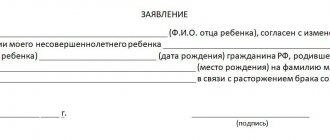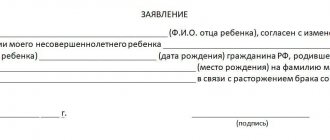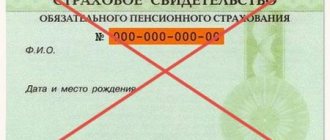Any citizen over 18 years of age can freely change personal data - last name or first name. Changing a surname after a divorce is an accessible and simple procedure that can be carried out both along with a divorce and at any time after it.
Difficulties begin after changing your last name: you have to fill out all the documents again, do everything that was done immediately after marriage. Brides make the decision to change their last name to their husband's with ease and confidence, inspired by love and faith in the future. After starting a family, in a new status, they are forced to go to authorities for several weeks and notify them about the change of surname.
Therefore, when the question arises of whether to change the last name or leave the details of the ex-spouse, many are no longer so sure whether it is worth doing it again.
In what cases is a last name change required?
Not a single legislative act provides for situations in which, after a divorce, a woman would be obliged to return her maiden name. Even if the ex-husband categorically insists on this. A surname is not a thing, not an object of intellectual property, but only a part of personal data.
Legally, a common surname does not bind former spouses in any way; after a divorce, they become namesakes, and nothing more.
The only reason for change is moral beliefs and principles. If your ex-wife feels more comfortable returning her maiden name, she can do so. Considering the fact that it is more difficult for a minor child to change his last name after his parents’ divorce, many women leave their personal data intact. Different surnames for mother and child create many bureaucratic problems.
Important! When getting married, future spouses may decide to take the surname of the wife rather than the husband. Traditionally, a woman changes her data, but the law does not prohibit a man from doing so. Resentment towards relatives, an ugly surname and other reasons are a weighty argument for adopting your wife’s surname. Then, after the divorce, the question of returning the premarital surname will already be faced by the man.
Is it possible to leave my husband's last name?
There are no legislative or other prohibitions on leaving the husband's (wife's) surname. If the spouse does not want, for any reason, to change the surname that she bore during the marriage, it is her right to leave it or change it.
Even if the ex-husband is categorically against it and demands the mandatory return of her maiden name, the girl has every right to ignore this requirement.
And no court will rule otherwise. Moreover, in 90% of cases such an application will not be accepted for consideration and the case will not even reach a court hearing.
Pros and cons of the shift
Since the choice of surname remains with the citizen, the positive and negative aspects of the issue relate mainly to moral and ethical considerations.
By changing personal data after a divorce, a woman receives advantages:
- energetic freedom, according to psychics;
- psychological freedom and support from yourself on the path to a new life;
- if she did not have time to change any documents to her husband’s last name, this is no longer required;
- when a woman turns out to be the heir to her parents’ property, the notary will have no questions about her last name if she changed it to her maiden name.
Minuses:
- bureaucratic red tape with the re-registration of all documents (over the course of family life, more of them can accumulate than in the days when a family was created. A woman could get married without a dowry at all, and get divorced with a pension certificate, an apartment, a car or a plot of land behind her);
- the question arises of changing the child’s surname if he is under 18 years old, since there may be slight difficulties with entering into an inheritance (you will have to look for evidence why the child and mother have different surnames and collect additional papers);
- you have to get used to a different surname again, this is especially difficult if the spouses have been married for a long time.
So, the main reason for change can be called resentment towards your ex-husband and the desire to break all ties with him. By the way, family members do not always disagree with each other’s claims. Often a woman refuses to change her last name as a sign of respect for her ex-spouse or simply because they remained good friends, and this is not necessary.
How a wife’s personal data changes during a divorce
Regulatory legal acts of the Russian Federation guarantee an adult capable person the right to independently and freely decide under what surname he will live. There is no statutory obligation to change. A woman has the right to change her last name as many times as she wishes throughout her life. This is directly stated by the provisions of Art. 58 “Change of name” of the Federal Law “On Acts of Civil Status” (FZ-143 1997) and Art. 19 CG of the Russian Federation “Name of the citizen”. The Russian Family Code also does not indicate the need to change personal data either when registering a marriage or when dissolving it. During a divorce, a woman can keep her husband’s last name, return her maiden name, or take a completely new one.
When deciding which surname to live with after a divorce, you will have to take into account two main factors: the moral and ethical side and the purely pragmatic component of the difficult relationship with the world of bureaucracy. In the first case, the decision will be influenced by the attitude towards the ex-husband: does the woman value her ex-husband and continues to consider herself his wife, leaving her surname in memory of the happy years they lived together, or will she try to cut off everything that connected her with this man.
The second aspect concerns the need to make changes to numerous documents. Among them are a civil and foreign passport, a military ID for a woman liable for military service, a driver’s license, bank accounts, INN, SNILS, and medical insurance.
Another important point is the presence of children born in this marriage and bearing the surname of one of the parents. The optimal solution would be to bring such personal data of the mother and child to a single denominator.
How to change your last name in the registry office: at the time of divorce
There are two options for this procedure:
- directly during the divorce;
- at any time after it, having already received a certificate of divorce.
Divorce in the registry office is carried out by filing an application jointly by both spouses. They write one paper for two, filling out the columns according to the model. One of the points is the surname that will be assigned to each of the spouses after the termination of family relations. At this point, the woman can indicate her maiden name.
Important! The law prohibits writing any other surname in this case. You can change your data simultaneously with the divorce only to premarital data (or maiden name, if the woman has already changed her last name several times).
After 30 days, the divorce procedure ends, and each of the former spouses can pick up their new document confirming their status free from family ties. It will indicate the last name that each of the participants in the process indicated in the corresponding column.
How to change a child
Next, we will consider the option when the child remains with you, because in a situation where the children or the child remain with the spouse, it does not seem particularly appropriate to demand that the surname be changed to yours.
So, you decided to change your divorced surname to your maiden name, and there are two options:
- by mutual consent;
- with your intention and permission from the guardianship authorities.
If you change your surname, but mutual consent has not been received (and the spouse lives separately, but it is known where), you can get an appeal to the court; the ex-husband can claim to keep the surname and has grounds for this.
If the divorce was emotional and you feel anger or hostility towards your spouse, do not rush to change your children's last name.
You may want to get rid of all the elements that remind you of the past period, but you should think rationally based on the future benefits for your children. For example, if your spouse is wealthy or some of his relatives can benefit your children, you should not completely break such ties; think about the benefits for the upbringing and development of your children, and not just about your own feelings and prejudice.
On the other hand, there are options when you change the child’s surname unilaterally and obtain permission from the guardianship authorities. Here your spouse will not be able to challenge anything if you were given permission:
- when there is a man’s incapacity confirmed in court;
- when the spouse was deprived of parental rights;
- in the absence of payment of alimony;
- when you can’t establish where you live, you can’t get in touch;
- when he is not fully involved in upbringing, he is dismissive.
The presence of these factors allows you to independently contact the guardianship authorities and then change the child’s surname at your own discretion.
Consent of the second parent
This fact is recorded in writing and submitted to the relevant authorities. In particular, you will need to provide a copy of this decision.
In order to correctly draw up this document, it is advisable to contact a notary and draw up the original and certify the copy. You also don’t have to change your child’s last name after a divorce, and no consent is required for this.
If without the father's consent
As stated earlier, this is possible, but the consequences may vary. If the ex-spouse does not fall under the criteria that make his vote in this topic invalid, then after independently changing the child's surname, there may be legal proceedings initiated by the husband. In addition, after 14 years of age, the consent of the child himself is required, and children (even if they stay with you) may have two opinions on this matter.
Therefore, it is considered most correct to obtain consent whenever possible. Although, for example, if you change your child’s surname, and after that your ex-husband stops paying alimony and taking care of the child (children), then you can use these arguments in court in your own favor and the decision may be to approve the change of surname initiated by you.
Process
The process consists of interaction with guardianship authorities and contacting the registry office. First, you will need to obtain a decision (if the child is under 14 years old) from the guardianship authorities. At the same time, when a child is less than 14, but more than 10, the consent of the little citizen to the change is required.
The guardianship authorities are provided with:
- application for change of surname;
- birth certificate;
- Your passport;
- marriage certificates;
- sometimes the consent of the second parent, or documents that make his vote invalid (listed above).
After the approval decision, you submit this permit to the registry office, add there the child’s and marriage certificates and a state duty receipt.
Changing a surname on a general basis
The divorce certificate has already been received, it contains the husband's last name, but the ex-wife suddenly realized that she did not like it, was not comfortable and did not want it. She can contact the registry office for a change at any time. By the way, using this algorithm, any citizen can change personal data.
- Payment of state duty. To save time, it is better to start by going to the bank. The fee is mandatory for anyone wishing to change their last name. Its size for 2021 is 1000 rubles. This amount includes the change procedure itself and the execution of a special document confirming changes to personal data.
- Preparation of documents. Changing your personal data will require you to have the originals of the following documents with you:
- passport;
- birth certificate of the person who is going to change his last name (as well as his first or patronymic name);
- acts of birth registration for the applicant’s minor children;
- confirmation of marital status (in this case, a divorce certificate);
- receipt for payment of state duty (printout if payment was made online).
- Filling out the application. His form is usually issued at the registry office. Changes required:
- valid personal data;
- desired personal data;
- information about birth (date, place, number of supporting document);
- citizenship;
- family status and document number confirming it;
- personal data of children under 18 years of age;
- passport details of the applicant (including place of registration);
- reason for data change;
- list of attached documents;
- date of filling out the paper and signature of the applicant.
- Wait for the decision of the registry office. The fact is that changing your last name or other personal data may be refused. However, usually, such problems do not arise when returning premarital data. Those who have chosen a non-existent or offensive first name, patronymic or last name may be refused. The waiting period is 30 days. A month after the registry office accepts the application, you can receive a document confirming the change of personal data.
Who will have to change their last name in court?
Those who can apply for a judicial solution to the issue:
- files for divorce through the court - in the claim you can indicate a request to change your last name;
- who was denied a change of personal data by the Civil Registry Office;
- simultaneously with changing the child’s surname, if this issue had to go to court. It is usually more difficult for a child to change his last name: this requires the permission of both parents, as well as the guardianship authorities. They go to court when either the guardianship has refused permission, or you still have to turn to the judge to establish the child’s place of residence, the procedure for communicating with parents, etc.
The judicial method of resolving the issue somewhat delays the matter: you will have to wait up to three months from the moment the application is accepted: scheduling a court hearing, waiting for the court decision to enter into force, contacting the registry office to register a change of surname and waiting for the final document.
Is it possible to give children their mother's surname during a divorce?
Giving a child his mother's surname after a divorce is possible only by mutual consent of the parents. If the child has already reached the age of ten, then any changes to his name are possible only with his personal consent.
The exception is situations when the ex-husband falls under the provisions of paragraph 2 of Art. 59 RF IC.
Changing a child’s personal data in court
The law provides for the procedure for changing the name of only a minor child of both parents under Article 59 of the RF IC, this is done at the mutually agreed upon request of the parents. The husband’s opinion is not taken into account if he is deprived of parental rights, is officially recognized as missing, or is evading the maintenance of a child and his upbringing in accordance with paragraph 2 of Art. 59 RF IC.
The last point must be confirmed by documentary evidence: a certificate of search for an alimony defaulter, a court decision, an extract from the criminal case materials. This position is associated with the priority of the interests of children over the interests of parents. It is enshrined in paragraph 1 of Art. 3 of the Convention on the Rights of the Child. For former spouses, a change of surname upon divorce in court is possible only if it was declared invalid in accordance with Art. 27 RF IC.
Find out the court decision online
Adopted court decisions are published on specialized websites within 24 hours from the date of adoption. In order to find the desired court decision on divorce by a famous surname, you can use several resources:
- State automated system "Justice".
- Website "Card Index of Arbitration Cases".
- Web catalog "Court decisions".
- Resource “Judicial and regulatory acts of the Russian Federation”.
You can also find out the court's decision on divorce by last name via the Internet by entering additional parameters in the search window.
The search is performed:
- according to the details of a specific court;
- the exact date of the meeting;
- case number.
Such information is subject to certain restrictions. In the context of the topic of our article, we point out that materials from adoption cases are not posted on the Internet.
Is it possible to contact the MFC to change your last name?
Yes. Most multifunctional centers are authorized to accept and issue documents relating to the change of personal data. You can sign up through State Services and pay the fee there.
The papers that are required to change your name at the MFC are the same as for going to the registry office. An application is also written, then the MFC transfers the documents to the registry office. After the waiting time has expired, you can obtain a certificate of name change at the same MFC where the documents were submitted.
Replacement of driver's license
Replacement of a driver's license on the basis described in the article is carried out on a general basis with one exception; provision of a medical commission's opinion is not required.
The applicant submits an application indicating the details of the old ID, passport and the reason for the replacement.
There is no need to go to the traffic police to submit an application; you can do this on the State Services website.
In the case of an electronic application, the fee will be 1,400 rubles, when applying through the MFC or the traffic police - 2,000 rubles.
Results of changing the surname and further actions
The document confirming the change is:
- divorce certificate, if personal data was changed immediately during the divorce process;
- certificate of name change.
The next mandatory step is to replace your passport.
A woman must contact the FMS after changing her last name due to divorce within 30 days from the date indicated in the document. This is a routine procedure that all citizens of the Russian Federation undergo upon reaching a certain age, as well as in connection with a change in data. The document received at the registry office is the basis for changing the passport in this case. Replacement periods are up to 14 days. Cost – 300 rubles.
After receiving a new document, a divorced woman must take care of changing the following documents in the first 30 days:
- SNILS - more precisely, you need to notify the authority about the change of name. If a woman has a pension certificate, replace it immediately;
- compulsory medical insurance policy.
If necessary or at any time (the law does not limit the timing), you need to replace:
- driver's license and car documents;
- international passport;
- bank cards;
- individual personal accounts for utility services (some services change this data automatically, others continue to send receipts to the previous name).
If questions arise about the discrepancy between the last name in the passport and these documents, you can additionally present paper confirming the change (certificate of divorce or change of name). This is not very convenient to do, so it would be better to take care of a replacement.
What documents do not need to be changed when changing your last name:
- papers confirming ownership of real estate;
- TIN (you just need to notify the tax authority about the change in data and obtain a new certificate of registration);
- educational documents;
- employment history.
These documents are rarely used and are always combined with paper confirming the change of name.
Is it possible not to change?
Let us repeat, no one can force you to change your last name, you can generally have almost any name in your passport, the main thing is to draw up these documents correctly and officially. Therefore, only your personal choice matters here.
As for whether you should do this, I can recommend a simple algorithm. You just need to weigh all the advantages and disadvantages, for example, use the reasons noted earlier:
- psychological;
- household
In addition, look at the factor of having children. When children stay with your husband, it is often useful to keep his last name. It is also advisable not to change anything if the children are with you, but do not change the last name.









